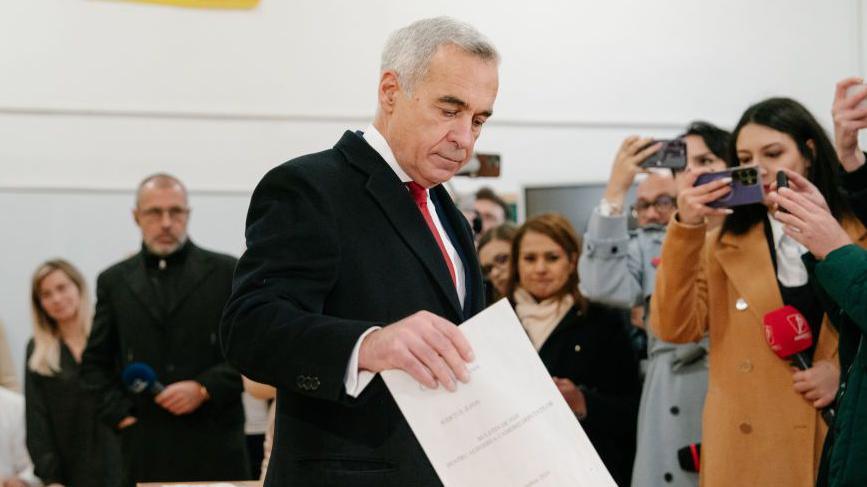How meddling blamed on Russia exploited real grievances in Romania
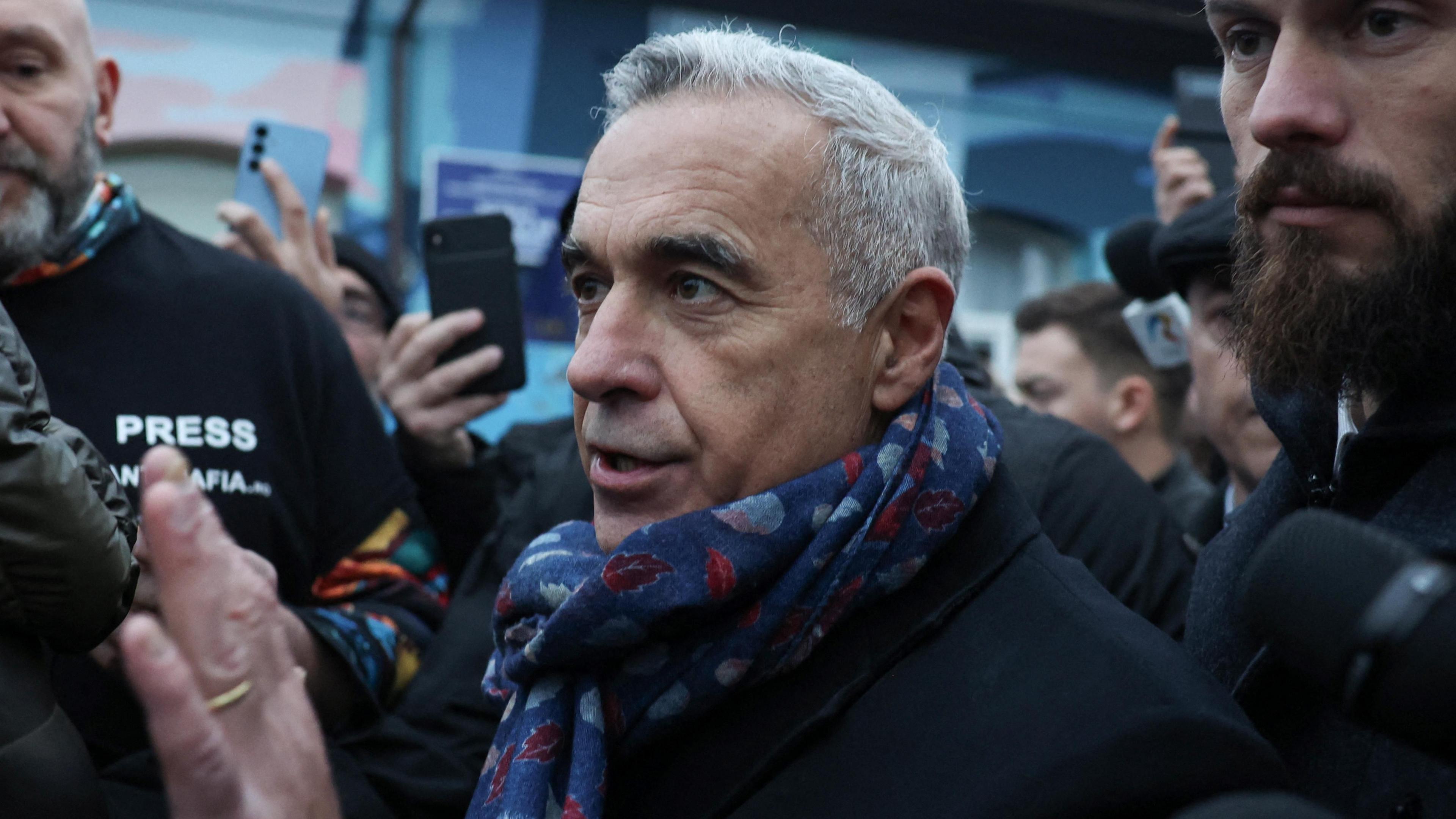
Calin Georgescu said the annulment of the vote was "an abuse and a crime"
- Published
"Romania dodged a bullet," is how a former deputy head of Nato Mircea Geoana puts it. "But it came very close."
Romanians are still stunned by the eleventh-hour cancellation of their presidential election after allegations of "massive" and "aggressive" meddling by Moscow to warp the vote, which saw a far-right candidate propelled by TikTok come close to victory.
"If Moscow can do this in Romania, which is profoundly anti-Russian, it means they can do it anywhere," Mircea Geoana warns.
Russia denies any interference in the election. But last week, in a highly unusual move, the intelligence agencies in Bucharest declassified documents detailing a major influence operation using the social media app.
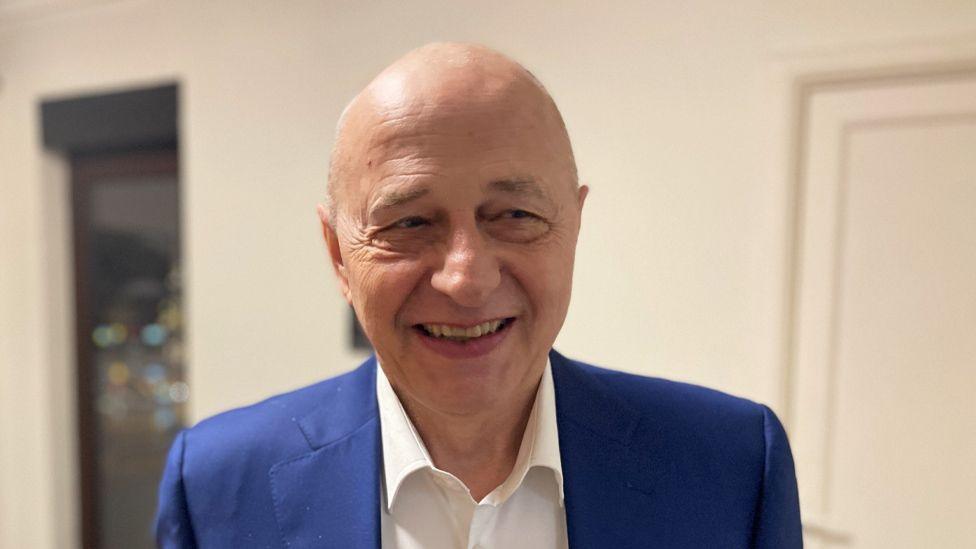
Mircea Geoana thinks Moscow can interfere in Romanian politics
It came after a shock first-round win by Calin Georgescu, a figure from the extreme fringe of Romanian politics. The constitutional court stopped the election on national security grounds.
The whole process will be rerun next year.
But whilst TikTok clearly did amplify Mr Georgescu's nationalist, religious and often bizarre messaging, it was Romanians themselves who liked what he said.
"The Russians are hugely sophisticated. But it's hugely mistaken to believe all of this was just because of Russia," Mr Geoana says.
"There is a whole cocktail of grievances in our society."
Frustration
On what should have been election day, Mr Georgescu appeared outside a shuttered polling station to denounce the annulment of the vote as "an abuse and a crime".
Flanked by bodyguards, he was greeted by a handful of fans and chants of "Georgescu for president". One man in white smock and flowing beard waved a giant flag; another held a large silver icon above Georgescu's head.
"People here are not happy with the current regime. They've done absolutely nothing for 35 years. Just a few new pavements, that's it," retired auditor Adriana complained, as the man she'd wanted as president vanished from view inside a crush of cameras and correspondents.
Adriana's pension was raised in August but prices in Romania are still climbing at the fastest rate in Europe. "90% of the increase will disappear with inflation," she told me.
Poverty, particularly the gulf between rural and urban lives, is a major cause of resentment here as well as a perception of corruption among the elite.
"This was a massive protest vote," believes Sorin Ionita of the Expert Forum in Bucharest. "The question then is: who do you vote for when you want to protest?"
"Somehow, TikTok helped channel that for Georgescu."
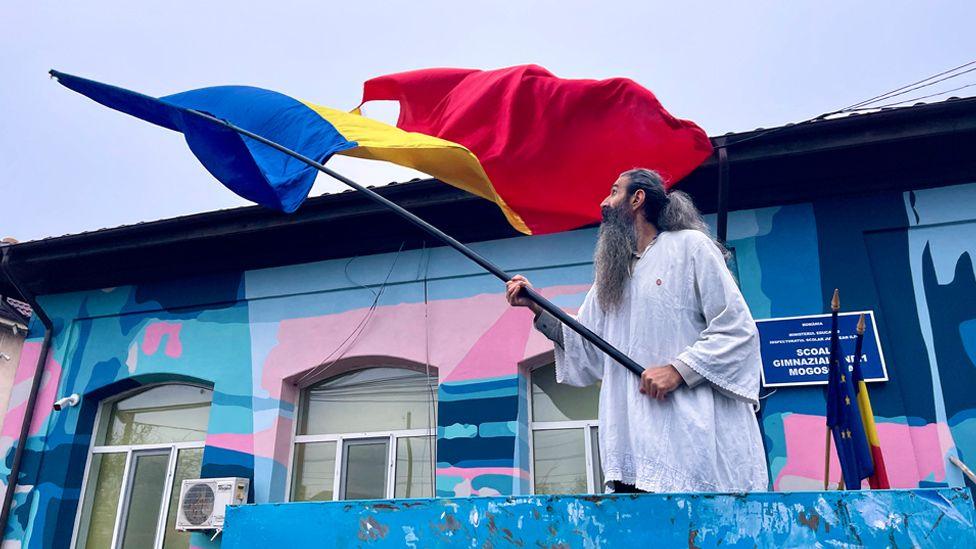
A man in white smock and flowing beard waved a giant flag to show his support for Mr Georgescu
Making Romania Great Again
There is real fatigue with the two main parties who have dominated the scene in Romania for years.
So on the streets of Bucharest there's suspicion that the judges' ruling to cancel the vote may have been driven as much by politics as security. Even those who feared a President Georgescu – and believe Russia was backing him - now worry about the precedent just set for Romanian democracy.
Mr Georgescu's own political career began firmly within the mainstream, at the foreign ministry. He then moved to the margins where distrust of 'The System' and conspiracy theories swirl. He has denied the existence of Covid, questioned the moon landing and claims that water is something other than H2O.
All that has found a ready audience on social media.
"He's like a preacher, with a Bible in his hand, and I thought he spoke only the truth," Ion Godin told me.
It was a nod to the cult leader-like vibe from Mr Georgescu that partly stems from his rare appearances in public. A campaign video of him cantering through fields on a white steed also helps.
But something else also resonates for Mr Godin.
"He talks about rights and dignity," he said. "Romanians go to other countries for work, but we have so many resources here. Wood, grain - and our soil is very rich. Why should we be vagrants in Italy?"
The promise of returning sovereignty and national pride works well. In the midst of the scandal over the presidency, far-right parties doubled their support in parliament. Calls to cancel that election too were rejected.
Georgescu's Trump-style pledge to Make Romania Great Again helped him perform particularly strongly among the vast Romanian diaspora. Many who left because life was so tough are now getting by abroad rather than prospering.
"He's corrupt? He's with Putin? No, he's not. He's with the people. With Romania," a young woman called Raluca was emphatic, recently back from working in London.
"Georgescu is a patriot. He wants peace, not war, and we want that, too."
After ten minutes or so, the scrum around the politician parted to set him free and I managed to get close. I wondered whether he was now calling people out onto the streets to demand that the "coup" he has claimed, be reversed?
"I am not here to protest, I was just here to pray," Mr Georgescu replied mysteriously, without breaking step. His guards then brushed me aside and bundled him back into his car.
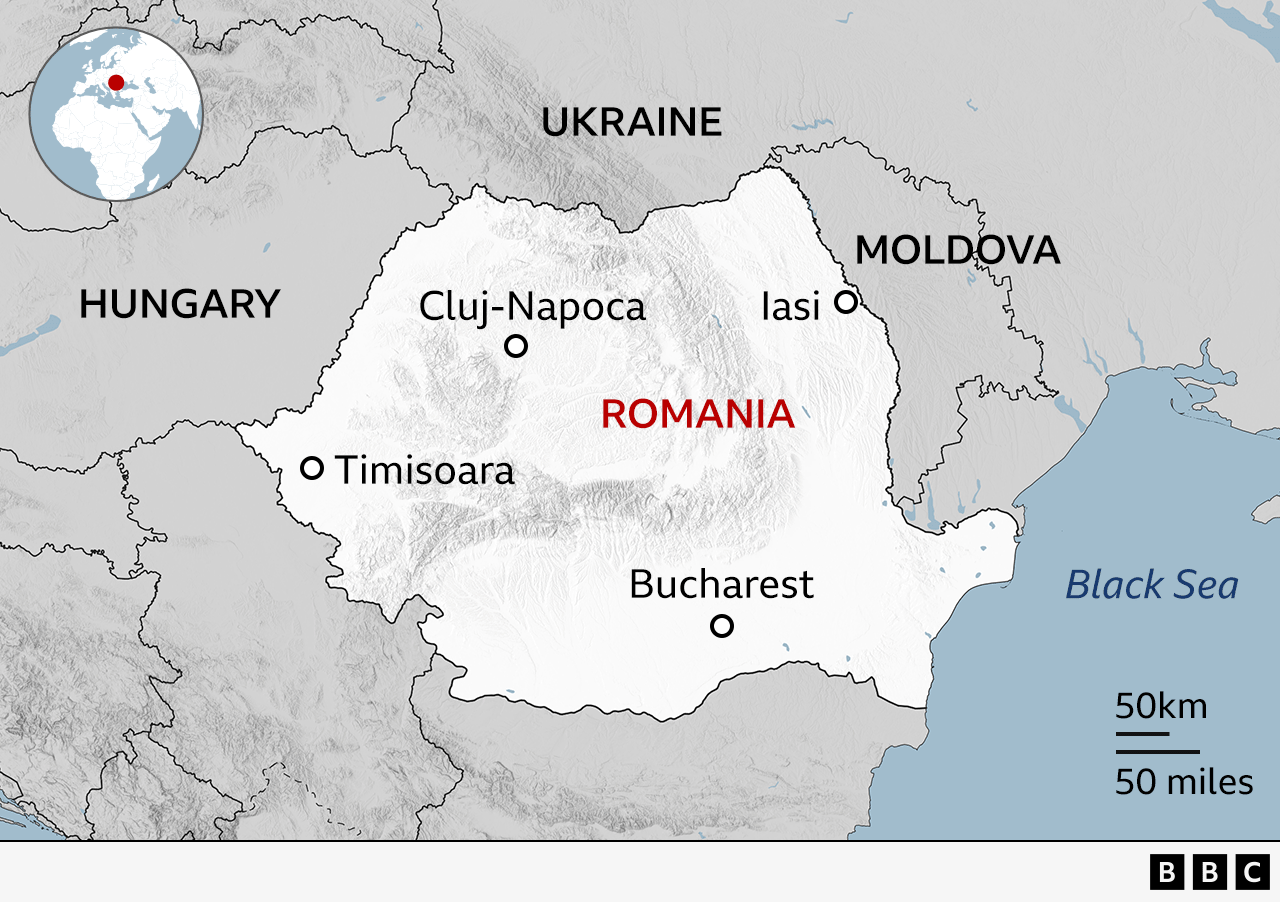
Kremlin agenda
There is no sense that Calin Georgescu knew he was being used by Moscow. He laughed at that suggestion when I put it to him a few days ago, in an interview.
But many of his stated positions are useful to Russia.
"You can't be very pro-Russian in Romania, it doesn't work," analyst Sorin Ionita points out. "But every point of Putin's agenda was part of his campaign."
On Ukraine, for example, Mr Georgescu told me that he would end all military aid immediately and push for peace but would not say whether this should be on Kyiv's terms. He called Vladimir Putin a "patriot".
Romanians are genuinely anxious about being sucked into the war next door: Russian drones have crashed over the border several times and Putin's escalatory rhetoric is disturbing.
But the Georgescu campaign played on that fear as well as whipping up resentment of refugees.
"All the far-right candidates, including Georgescu, included a slice of Ukraine hate speech in their bubble of propaganda," Brianna Caradja told me, recalling false claims about refugee children getting huge state handouts, more than locals.
She's been arranging big aid deliveries to Ukraine since the start of the full-scale invasion but donations from businesses and shops have dried up as the political climate has become more hostile.
"I get threats. It's grown since the first round of the elections," Brianna confides. "There's language I didn't hear before, like 'traitor'. That's a very heavy word, especially when you realise these people are from the ultra-right."
The intelligence report on the elections lists "encouraging discontent" with support for Ukraine as one aspect of Russia's hybrid war on Romania. It comes under "Disinformation and Propaganda".
Covert campaigning
Calin Georgescu's insistence that he spent "zero" to disseminate his election message is also now under investigation.
One man is said to have spent almost $400,000 (£313,000) promoting online content linked to the former candidate, who claims not to know him.
Authorities have searched the house of this mysterious benefactor, Bodgan Peschir, and also called internet influencers in for questioning.
Some have admitted being paid to mention the election in videos where they'd usually promote detergent or lipstick. Those political posts were then flooded with hashtags like #wearevotingcalingeorgescu.
Campaigning without clear identification is banned by both TikTok and Romanian election law.
Sources within the prosecution service suggest making any case stick will be complicated, as Romanian intelligence went public early with their claims of Russian interference. Even Mr Georgescu now appears to have deleted all the videos from his official TikTok account.
But his supporters have gone nowhere.
"Someone wants something good for his country and they won't allow him to do that," Raluca believes, sure the candidate she voted for won't be allowed to run again. "Maybe he'll be in prison in months and for what? For nothing," she told me. "We feel lost right now, without hope."
The shock halt to the election was followed by calls for calm, not street protests, and that's holding so far.
But Mircea Geoana believes Romania was "on the brink of the precipice" when the constitutional court stepped in.
"We bought ourselves some time. But there is real fury here. And if we don't do something, we might have a repeat."
- Published6 December 2024
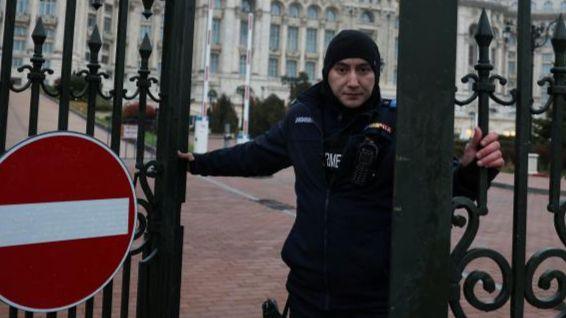
- Published6 December 2024
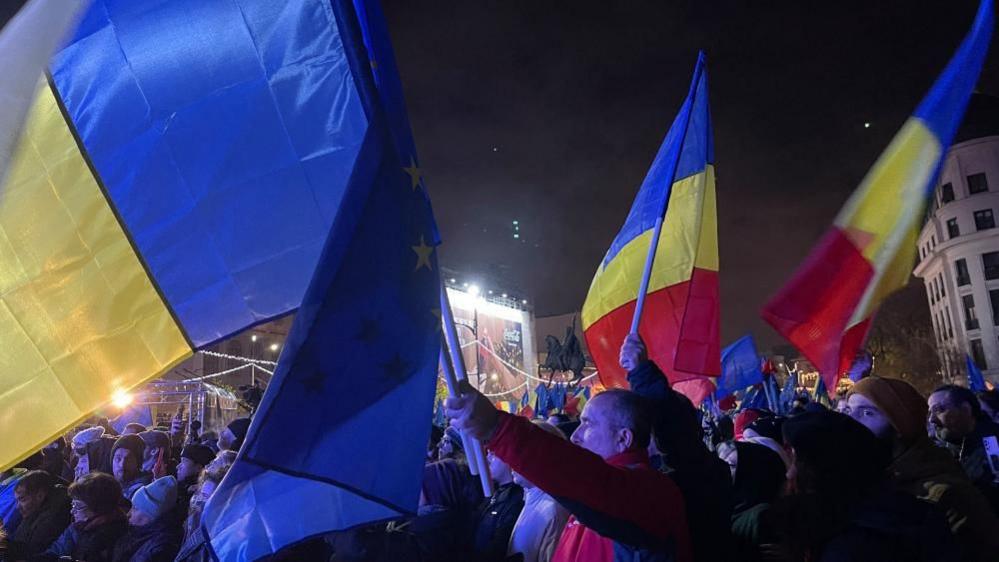
- Published6 December 2024
